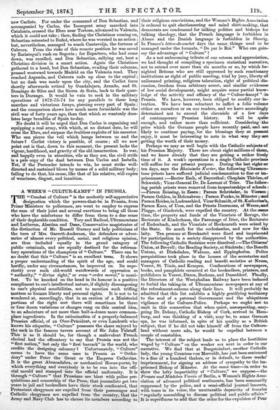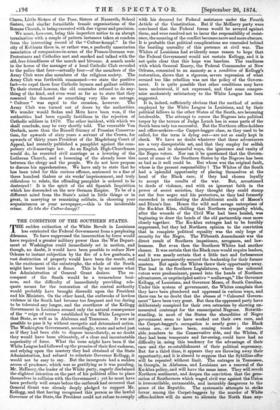A 'WEEK'S " CUL.UUE-KAMPF " IN PRUSSIA.
F 111±1 " Combat of Culture" is the modestly self-appreciative I_ designation which the powers-that-be in Prussia, from Prime -Ministers to policemen, are wont to employ to express the sum of their joint and several exertions to bring all those who have the misfortune to differ from them to a due sense of their deplorable condition. Tory and Radical, Ultramontane and Lutheran, Alsatian and Dane, Conservative magistrates of the distinction of Mr. Russell Gurney and lady politicians of the turn of Mrs. Garrett-Anderson, the defenders or adver- saries of 'almost every political, social, and religious opinion, are thus included equally in the grand category of public criminals, and are equally destined for the reforma- tory operations of the champions of "Culture." There can be no doubt that this " Culture " is an excellent term. It shows a proper understanding of the spirit of the age, and could hardly, under any circumstances, be improved on. Its supe- riority over such old-lworld watchwords of oppression as "authority," "divine right," or even "ordre moral," is mani- fest. To be knocked on the head in its honour is a positive compliment to one's intellectual nature, if slightly discomposing to one's physical sensibilities, not to mention such trifling matters as human liberty and personal rights. It is not to be wondered at, accordingly, that in an oration of a Ministerial partisan of the right sort there will sometimes be three or four dozen variations or changes rung on this central idea, to an admixture of not more than half-a-dozen more common- place ingredients. In the ratiocination of a properly-balanced Prussian official, of an Ober-Prasident, or even Landreth who knows his etiquette, "Culture" possesses the share enjoyed by the sack in the famous tavern account of Sir John Falstaff. This is as it should be, for though a malevolent French clerical had the effrontery to say that Prussia was not the "first nation," but only the 1‘ first barrack" in the world, who
credits the designing calumny Unfortunately, "Culture" seems to have the same uses in Prussia as "Ortho- doxy" under Peter the Great or the Empress Catherine. It is the great Abracadabra, or mechanical Hocus-pocus, by which everything and everybody is to be run into the offi- cial mould and stamped into the official uniformity. It is through " Culture " that Prussians are blest with police per- quisitions_and censorship of the Press, that journalists get two years in jail and booksellers have their stock confiscated, that Protestant clergymen are expelled from their parsonages and Catholic clergymen are expelled from the country, that the Army and Navy Club has to choose its members according to
their religious convictions, and the Woman's Rights Association is ordered to quit electioneering and mind shirt-making, that democrats are condemned for talking polities and bishops for talking theology, that the French language is forbidden in Alsace and the Danish language is forbidden in Slesvig. In France's lettre-de-cachet days the same things used to be managed under the formula, "Do par le Roi." Who can gain- say the advantage of " Culture" $ As a not unbecoming tribute of our esteem and appreciation, we had thought of compiling a specimen statistical narrative, not to extend over more than six months or so, by which be- nighted Britons who are still oppressed by such reactionary institutions as right of public meeting, trial by jury, liberty of unlicensed printing, religious toleration, right of political dis- cussion, freedom from arbitrary arrest, and similar evidences of low social development, might acquire some partial know- ledge of the activity and efficacy of the 44 Cultur-kampf " 'in Prussia. We have, however, been obliged to modify our in- tention. We have been reluctant to inflict a folio volume either on ourselves or on our readers, and we have accordingly determined not to exceed the chronicle of a few days
of contemporary Prussian history. It will be aquite enough, and rather more than sufficient. Considering the price which the German people have recently paid, and are likely to continue paying, for the blessings they at present enjoy, it must be interesting to note in what :way they are getting the worth of their money.
Perhaps we may as well begin with the Catholic subjects. uf his Prussian Majesty. There are about eight millions of them, and we know already that they are getting a rather lively time of it. A week's operations in a single Catholic province will suffice for our prbsent purpose. During the last eight. or ten days, says the liheinische Kurier, the following Ultramon- tane iniests have suffered judicial condemnation to fine or im-
prisonment :—Rector Each, of Bayenthal ; Chaplain Thielen,.of Schweich; Vicar-General Dr. De Lorenzi of Trier. The follow-
ing parish priests were removed from inspectorships of schools : —Parson Beissing, in Essen ; Parson Schroteler, in Vienne ; Parson Gehlen, in Helenabrun ; Parson Funke, in Munster ; and Parson Heides, in Ludenschied. Vicar Schmidt, of St. Katherine's, Parson Kaes, of ljess, and the Priests Doormans, of Weeze,and Plagge, of Ginderick, were expelled the country. At the same time, the property and funds of the Vicariate of Roruge, the Rectorate of Kinderhaus, the Parsonage of Itter, the Rectorate of Eudenbach, and the Vicariate of Herkenrath were seized by the State. So much for the ecclesiastics, and now for the laity. Ten persons at Bernkastel were fined and imprisoned for participation in a society disapproved by the authorities. The following Catholic Societies were dissolved :—The Citizens' Union, at Breyell ; the Reading Society, at StIchteln ; the Benefit Unions, at Dinksladen, Walsum, and Eppinghofen. Police perquisitions took place in the houses of the secretaries and managers of Catholic reading and benefit societies at NOUN, Voerst, St. Minis, and Kempen. Confiscations of newspapers, books, and pamphlets occurred at the booksellers, printers, and publishers in Voerst, Dfiren, Bochum, and Dusseldorf. `Finally, the Directors of the Westphalian Railway have been induced to forbid the taking-in of Ultramontane newspapers at any of the refreshment-saloons along their lines. It will probably be admitted that this list exhibits a highly gratifying testimony to the zeal of a paternal Government and the ubiquitous vigilance of the Culture-Police. Perhaps we ought not to omit in this connection that when quiet, unsuspecting, easy- going Dr. Delany, Catholic Bishop of Cork, arrived in Ham- burg, and was thinking of a visit, may be, to some German spa, he was informed, in spite of his quality as a British subject, that if he did not take himself off from the Culture- land without more ado, he would be expelled between a couple of constables. The interest of the subject leads us to place the hostilities waged by " Culture " on the weaker sex next in order in our narrative. We find that at Burgsteinfurt, another Catholic lady, the young Countess von Merveldt, has just been sentenced to a fine of a hundred thalers, or in default, to three weeks' imprisonment, for signing an address of sympathy to the im- prisoned Bishop of Minster. At the same time—in order to show the lofty impartiality of "Culture," we suppose—the Frauen uncl Ma:de/ten Verein of Berlin, a Woman's Rights Asso- ciation of advanced political sentiments, has been summarily suppressed by the police, and a semi-official journal laments, with tears in its voice, the unutterable depravity of females "regularly assembling to discuss political and public affairs." It is superfluous to add that the order for the expulsion of Poor
Clams, Little Sisters of the Poor, Sisters of Nazareth, School Sisters, and similar formidable female organisations of the Roman Church, is being executed with due vigour and precision.
We must, however, bring this imperfect notice to an abrupt termination with a couple of pattern instances taken at random from the interesting record of the " Cultur-kampf." In the city of Koblentz there is, or rather was a perfectly unsectarian association of companions-in-arms of the Franco-German war. Protestants and Catholics met and smoked and talked with the old, free friendliness of the march and bivouac. A search made in the house of the manager of ti local Catholic Club revealed to the police that four—actually four—of the members of the Army Club were also members of the religious society. The Army Club was forthwith summoned—we state the positive fact—to expel these four Catholic laymen and gallant soldiers. To their eternal honour, the old comrades refused to do any- thing of the kind, and even went so far as to state that they resented the demand as something very like an outrage. " Culture " was equal to the occasion, however. The Army Club was turned out of doors by the authorities. We wonder would Sedan and Metz have been won, if the authorities had been equally fastidious in the rejection of Catholic soldiers in 1870. The other incident, with which we shall conclude, may be very shortly told. The venerable Von Gerlach, more than the Russell Gurney of Prussian Conserva- tism, for upwards of sixty years a servant of the Crown, for upwards of thirty years President of the Magdeburg Court of Appeal, had recently published a pamphlet against the com- pulsory civil-marriage law. As an English High-Churchman would do, he resented civil marriage as a lowering of the Lutheran Church, and a loosening of the already loose ties between the clergy and the people. We do not here propose to discuss his apprehensions. We have only to state that he has been tried for this curious offence, sentenced to a fine of three hundred thalers or six weeks' imprisonment, and truly ridiculous to relate, the offending pamphlet is ordered to be destroyed ! It is the spirit of the old Spanish Inquisition which has descended on the new German Empire. To be of a different mind from the State's mind in little things or in great, in marrying or remaining celibate, in choosing your acquaintances or your newspaper,—this is the intolerable crime. Es &Le der Cultur-kampf!































 Previous page
Previous page